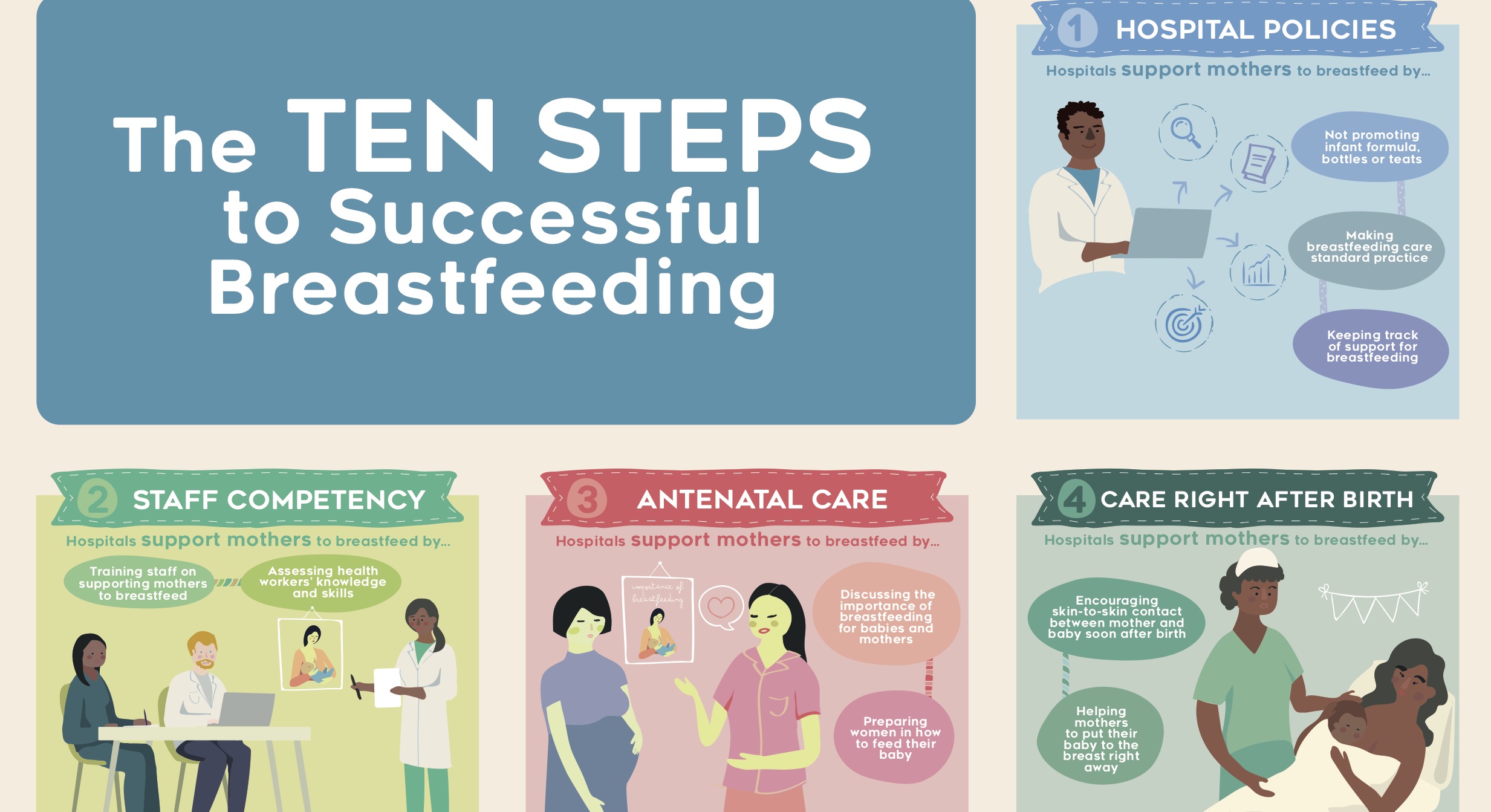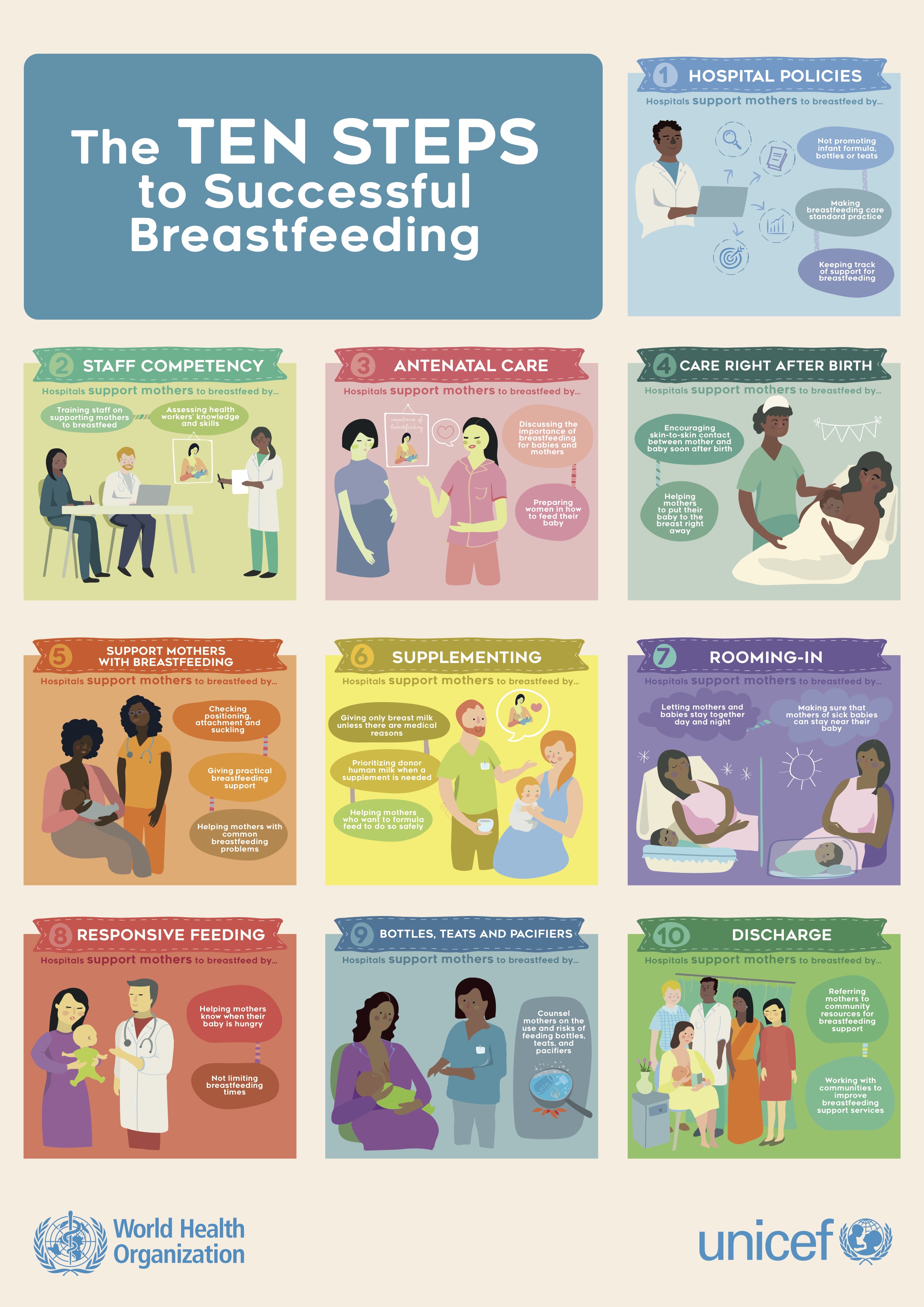For these reasons the World Health Organization WHO recommends that breastfeeding should be initiated within the first hour after birth and that infants should exclusively breastfeed for the first 6 months. 131718 The BFHI guidelines as written by the Academy of Breastfeeding Medicine require informing patients of the risks of formula but do not require health workers to inform parents of the risks of hospitalization or brain injury from avoiding supplementation while exclusively breastfeeding.

Who And Unicef Issue Revised Ten Steps To Successful Breastfeeding Bellies Abroad
Breastfeeding should not be decreased when starting on solids.

Who breastfeeding recommendations 2018. WHO also recommends early and uninterrupted skin-to skin contact rooming-in and kangaroo mother care which significantly improve neonatal survival and reduce morbidity. How families and childcare professionals may safely transport and store expressed breast milk. To enable mothers to establish and sustain exclusive breastfeeding for 6 months WHO and UNICEF recommend.
In 2011 South Africa committed to promoting exclusive breastfeeding EBF for six months for all mothers regardless of HIV status in line with World Health Organization recommendations. Famous moms who breastfeed. Precautions to take when feeding your infant after a flood hurricane or other emergency.
The guidelines offer no patient education on these danger signs for when. Foods for the baby can be specially prepared or modified from family meals. Protecting promoting and supporting breastfeeding in facilities providing maternity.
WHO consolidated guidelines on the use of ARV drugs recommended one of two approaches. In Africa only 37 of infants under 6 months of age were exclusively breastfed in 2017 Bhattacharjee Schaeffer Marczak Ross Swartz Albright Hay 2017. The World Health Organization WHO believes that breastfeeding is the most natural way a woman can feed her baby and that virtually any women can nurse her baby.
Initiation of breastfeeding within the first hour of life. Geneva World Health Organization. Breastfeeding all babies for the first two years would save the lives of more than 820000 children under age 5 annually.
To meet the growing needs of babies at six months of age mashed solid foods should be introduced as a complement to continued breastfeeding. During World Breastfeeding Week WHO celebrates breastfeeding as a vital part of healthy child development and the best start to life for any baby. Skin-to-skin contact RR 95 confidence interval Exclusive breastfeeding at hospital discharge to 1 month post birth 130 112 149 Exclusive breastfeeding at 6 weeks to 6 months post birth 150 118 190 Breastfeeding at 1 month to 4 months post birth 124 107 143.
In the United States the American Academy of Pediatrics AAP currently recommends. For many of these issues nonpharmacologic treatments are recommended including cold packs and frequent breastfeeding. Care right after birth.
Substitutes as well as other WHO evidence-based recommendations. GENEVA 11 April 2018 - The World Health Organization WHO and UNICEF today issued new ten-step guidance to increase support for breastfeeding in health facilities that provide maternity and newborn services. Protecting promoting and supporting breastfeeding in facilities providing maternity and newborn services.
Infants should be fed breast milk exclusively for the first 6 months after birth. Guidelines Recommendations. After months of thoughtful and productive discussion with our five global breastfeeding promotion organizations on April 11 2018 the World Health Organization WHO and United Nations Childrens Fund UNICEF released the final version of the Implementation Guidance.
Exclusive breastfeeding means that the infant does not receive any additional foods except vitamin D or fluids unless medically recommended. WHO recommends exclusive breastfeeding for the first 6 months of life followed by continued breastfeeding with appropriate complementary foods for up to 2 years and beyond. They know that this is the best option a mother can offer her little ones.
Breastfeeding is one of the foundations of child health development and survival. Or 2 providing lifelong ART to all pregnant and breastfeeding women living with HIV regardless of CD4 count or clinical stage option B. Exclusive breastfeeding that is the infant only receives breast milk without any additional food or.
Released in 2003 the current World Health Organization WHO breastfeeding recommendations advocate that babies should be put to the breast within 1 h after birth be exclusively breastfed for the first 6 months continue breastfeeding up to two years of age or beyond and receive complementary foods after the 6 months. This guideline Protecting promoting and supporting breastfeeding in facilities providing maternity and newborn services is an update of and supersedes the Ten Steps to Successful Breastfeeding as published in a joint statement by the World Health Organization WHO and the United Nations Childrens Fund UNICEF Protecting promoting and. The revised Baby-friendly Hospital Initiative 2018--Implementation guidance.
This was a marked shift from earlier policies and with it average EBF rates increased from less than 10 in 2011 to 32 by 2016. WHO breastfeeding recommendations. October 23 2019 Mya Leave a comment.
Daria is a 26-year-old mother of 3 in Moscow Russian Federation. She and her husband share a firm belief in the value of breastfeeding in line with international public health recommendations. 4 to promote timely and adequate complementary feeding in accordance with the guiding principles for complementary feeding of the breastfed child5 as well as guiding principles for the feeding of the non-breastfed child 624 months of age6.
Famous moms who breastfeed Supermodel Gisele Bundchen posted this image to her Instagram account. For women who have a cesarean section 1 in 5 will experience severe acute postoperative pain pain that may require opioid medications according to a 2018 study in Anesthesia Analgesia. 1 providing ART during pregnancy and breastfeeding to women who are otherwise not eligible for ART option B.
Updated 2015 GMT 0415 HKT July 9 2018. While over two-thirds of mothers continue breastfeeding for at least one year by two years of age breastfeeding rates drop to 45 UNICEF 2018. Breastfeeding - Promoting and Supporting the Initiation Exclusivity and Continuation of Breastfeeding in Newborns Infants and Young Children 2018 Developed countries Agency for Healthcare Research and Quality.

Create Your Own Tree Of Life Breastfeeding Photo Life With Isabelle Breastfeeding Photos Breastfeeding Baby Breastfeeding

Dental Caries And Breastfeeding Dental Caries Breastfeeding Tooth Decay

Who And Unicef Issue Revised Ten Steps To Successful Breastfeeding Bellies Abroad

Moving Beyond Breastfeeding Initiation A Qualitative Study Unpacking Factors That Influence Infant Feeding At Hospital Discharge Among Urban Socioeconomically Disadvantaged Women Journal Of The Academy Of Nutrition And Dietetics

Pin On This Is An Inspiring Write Up Geared Towards Sustainable Agricultural Development